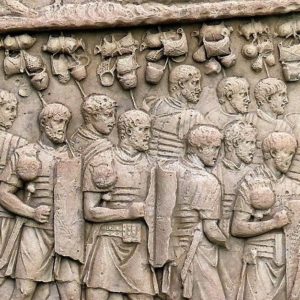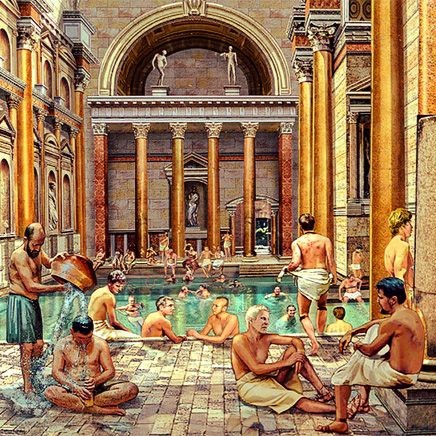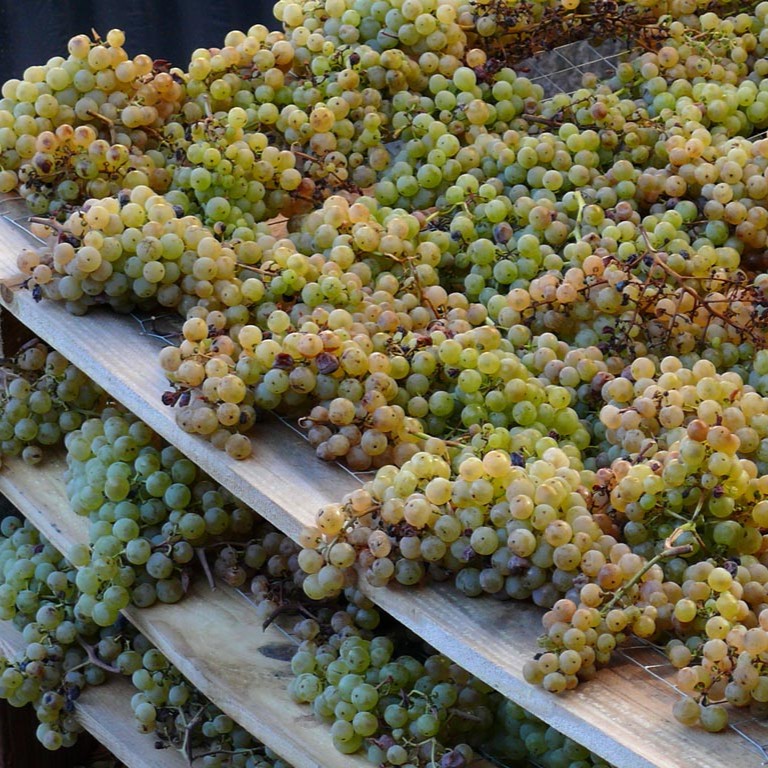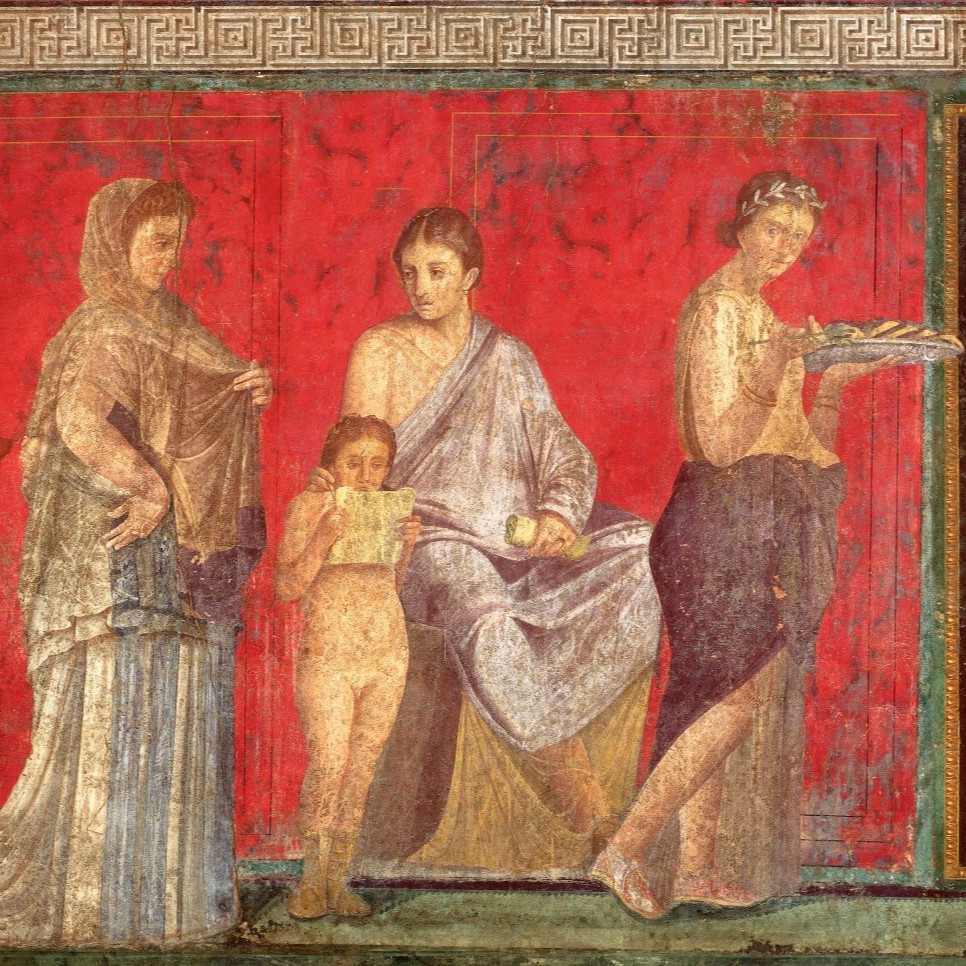
Translated from French with DeepL (please notify us of errors)
A Roman legionary, on a day when the army was on the move, could consume more than 4000 calories, just by walking, carrying his gear and carrying out daily activities, such as building or maintaining a camp[1]. Of course, soldiers did not often have the chance to eat big meals or to enjoy long-cooked food, even though the Roman army was very well organised. It provided several days’ rations of food to the soldiers: oil, salt, wine, meat, and above all wheat, the basic food. The latter was easy to process and provided a large proportion of the necessary calories. Mixed with water or milk, a simple porridge was quickly made, seasoned and enriched with whatever was on hand. Of course, all this made the pack heavier…
These same cereals could also be transformed into bread patties, cooked directly on the fire, or even on a metal element heated by the sun (and why not on the metal parts of a shield, then!)[2].
With the help of a small portable ceramic oven, called clibanus, placed on the fire, it was even possible to bake bread, and thus improve daily life a little. To do this, it was necessary to have ground the cereals, which was possible thanks to small millstones that were transported by the legions. Archaeologists have also found portable grills, perfect for cooking other foods.

But more was probably needed to compensate for the miles travelled, up to 25 per day. The legionnaire also had to feed himself with what he found along the road, for example fresh produce gleaned, bought or sometimes plundered in the countryside he crossed.
In spite of this, it is assumed that the legionnaires were frequently undernourished, without this reducing their performance too much, as is the case with some top athletes today. Their diet, which was not very varied, must also have led to deficiencies. In short, one did not join the legion out of greed…
A few centuries earlier, Aristophanes, the famous Greek comic poet, mocked the breath (and even the overall smell) of soldiers[3], writing that they often ate cheese and… onions.
Trygaeus: (…) What a gorgeous face you’ve got there, Theoria, and sweet breath! So fragrant to my heart! It’s just lovely —like perfume or freedom from conscription.
Hermes: You mean she smells just like a soldier’s pack?
Trygaeus: The hateful pack of such a hateful person makes me puke —it stinks of onion belches.
[…]
Chorus: I’m full of joy, yes, full of joy, free from helmets, free from cheese, and free from onions, too. I don’t find battles any fun —not like good parties with my friends and steady drinking round the fire, blazing wood from well-dried logs cut up in summer time, cooking chick peas, roasting acorns, giving our Thracian girl a kiss, while the wife is in her bath!
Did the Roman legionaries have better breath than their Greek predecessors?
Science does not yet have an answer to this question…
[1] Fornaris et Aubert, Le légionnaire romain, cet athlète méconnu, Histoire des sciences médicales, tome XXXII, 1998.
[2] See the AVREI entry in our page sur les recettes antiques.
[3] Aristophanes, Peace, v. 359 et sqq, then 1128 et sqq, (full text in grec, full text in english)
Τρυγαῖος: (…) ὦ χαῖρ᾽ Ὀπώρα, καὶ σὺ δ᾽ ὦ Θεωρία. οἷον δ᾽ ἔχεις τὸ πρόσωπον ὦ Θεωρία, οἷον δὲ πνεῖς, ὡς ἡδὺ κατὰ τῆς καρδίας, γλυκύτατον ὥσπερ ἀστρατείας καὶ μύρου.
Ἑρμῆς: μῶν οὖν ὅμοιον καὶ γυλιοῦ στρατιωτικοῦ;
Τρυγαῖος: ἀπέπτυσ᾽ ἐχθροῦ φωτὸς ἔχθιστον πλέκος. τοῦ μὲν γὰρ ὄζει κρομμυοξυρεγμίας,
[…]
Χορός: ἥδομαί γ᾽ ἥδομαι κράνους ἀπηλλαγμένος τυροῦ τε καὶ κρομμύων. οὐ γὰρ φιληδῶ μάχαις, ἀλλὰ πρὸς πῦρ διέλκων μετ᾽ ἀνδρῶν ἑταίρων φίλων, ἐκκέας τῶν ξύλων ἅττ᾽ ἂν ᾖ δανότατα τοῦ θέρους †ἐκπεπρισμένα†, κἀνθρακίζων τοὐρεβίνθου τήν τε φηγὸν ἐμπυρεύων, χἄμα τὴν Θρᾷτταν κυνῶν τῆς γυναικὸς λουμένης.
Other articles in English from the Nunc est bibendum blog








